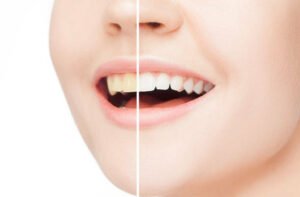Composite bonding is a common dental treatment. It is used to fix chipped, cracked, or discoloured teeth. Dentists also use it to close small gaps or reshape teeth. The material used is a tooth-coloured resin. This resin is carefully applied, shaped, and hardened with a special light. It sticks to your teeth and gives them a smooth, natural look.
This treatment is quick and does not hurt. It usually takes one visit. While the results are instant, your teeth may feel a little strange at first. This feeling is normal and should go away soon.
Why Do Teeth Feel Odd After Bonding?
After tooth composite bonding, many people notice their teeth feel “off”. Some say their teeth feel too big or too smooth. Others feel their bite has changed. Your mouth is very sensitive to even small changes, which is why you may notice these things.
Here are a few common reasons your teeth feel weird:
- New texture: Composite resin can feel smoother or rougher than natural teeth.
- Shape change: The shape of your teeth might have changed slightly. This can make your tongue or lips notice a difference.
- Bite adjustment: If the bonding adds bulk, your bite may feel slightly different.
- Sensitivity: Some people feel mild sensitivity to hot or cold food and drinks.
- Tongue awareness: Your tongue explores new surfaces, making them feel more noticeable.
How to Get Rid of Stains on Composite Bonding
How Long Will the Weird Feeling Last?
For most people, the odd feeling goes away in a few days. Your mouth simply needs time to get used to the new shape. In some cases, it might take up to one or two weeks.
But here’s the good news: your brain and body adjust quickly. Once you stop thinking about it, you’ll likely stop noticing it.
If your bite still feels off after two weeks, it’s best to visit your dentist. They can make small adjustments to improve comfort.
Is Sensitivity Normal
Yes, it is. Some people feel slight sensitivity in the bonded tooth, especially when eating or drinking hot, cold, or sweet things. This is usually due to the resin material or a change in how your teeth touch.
The sensitivity should ease within a few days. To help, you can:
- Avoid very hot or cold foods
- Use toothpaste for sensitive teeth
- Chew slowly on the other side of your mouth
If sensitivity lasts more than a week, book a check-up.
Can You Eat Chips with Bonded Teeth?
Common Feelings After Bonding
Here are some sensations people report after getting composite bonding:
- Too smooth: The resin feels smoother than natural enamel.
- Too bulky: The bonded area may feel thicker at first.
- Slight pressure: Some feel pressure when biting or chewing.
- Uneven bite: If the bite feels different, adjustments may be needed.
- Unusual speech: Tongue placement can feel off, causing a slight lisp. This usually fades quickly.
Tips to Adjust Comfortably
Getting used to bonded teeth is easy with a few simple steps:
- Eat soft foods for the first few days
- Avoid very crunchy or sticky snacks
- Rinse with warm salt water to soothe your mouth
- Talk and smile more – this helps your lips and tongue adjust
Remember, most people feel normal again within a week.
Can You Bite into an Apple with Composite Bonding?
How to Care for Bonded Teeth
Looking after your bonded teeth is key. Composite bonding can last many years with proper care. Here’s what to do:
- Brush twice a day with a soft toothbrush
- Floss daily to keep gums healthy
- Avoid biting hard things, like ice or pens
- Limit staining foods like tea, coffee, wine, and curry
- Don’t smoke, as it can stain the resin
- Visit your dentist regularly for cleanings and check-ups
Composite resin is strong, but not as hard as enamel. Treat it gently and it will last longer.
When to See Your Dentist
You should see your dentist if:
- Your bite still feels wrong after two weeks
- You feel sharp pain when eating
- The bonded tooth becomes rough or chipped
- Sensitivity does not go away after several days
It’s always best to get things checked early to avoid problems later.
How Long Does Composite Bonding Usually Last?
Final Thoughts
It’s completely normal for your teeth to feel a little odd after composite bonding. Your mouth just needs time to adjust. In most cases, the feeling fades within a few days, and your new smile becomes second nature.
If you care for your bonded teeth and follow your dentist’s advice, your results will last for years. And most importantly, your confidence will grow with your new, improved smile.
Book your consultation today!
Book Your Appointment Today at Bridge St Aesthetic and Dental Implant Clinic
If your teeth still feel unusual after composite bonding or you’re considering improving your smile, our expert team at Bridge St Aesthetic and Dental Implant Clinic is here to help. We offer personalised dental care in a comfortable and friendly setting. Whether you need a quick adjustment or a full smile makeover, we’re ready to support you every step of the way.
📞 Call us today to schedule your consultation, and let’s bring back your confidence – one tooth at a time.
Get Composite Bonding treatment at Bridge St Aesthetic and Dental Implant Clinic in Aberdeen.
Aberdeen Composite Bonding 101: What Is It and How Does It Work?
Frequently Asked Questions
Is it normal for my bite to feel different after bonding?
Yes, it’s common. The bonding material may slightly change your bite at first. If the feeling doesn’t settle within two weeks, visit your dentist for minor adjustments.
Can composite bonding cause pain?
No, the procedure is usually painless. However, you might feel mild sensitivity for a few days, especially with hot or cold foods. This should go away quickly.
How long should the weird feeling last?
Most people adjust within a few days to a week. If the sensation lasts longer or worsens, it’s best to have your dentist check your bite.
Does the bonded area feel different forever?
No, once your tongue and mouth get used to the change, the area will feel completely normal. Your brain will stop focusing on the sensation over time.
What if I feel a sharp edge or bump?
Sometimes, bonding needs a polish or small adjustment. If something feels sharp or rough, your dentist can smooth it easily in just one visit.







